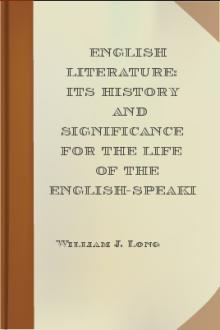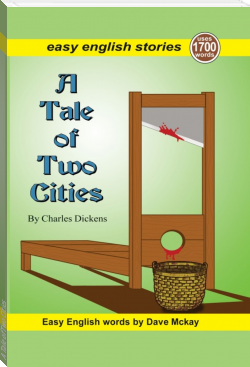English Literature: Its History and Significance for the Life of the English-Speaking World by William J. Long (good books for 8th graders txt) 📕

- Author: William J. Long
- Performer: -
Book online «English Literature: Its History and Significance for the Life of the English-Speaking World by William J. Long (good books for 8th graders txt) 📕». Author William J. Long
The next canto shows the life in the castle, and describes a curious compact between the host, who goes hunting daily, and the knight, who remains in the castle to entertain the young wife. The compact is that at night each man shall give the other whatever good thing he obtains during the day. While the host is hunting, the young woman tries in vain to induce Gawain to make love to her, and ends by giving him a kiss. When the host returns and gives his guest the game he has killed Gawain returns the kiss. On the third day, her temptations having twice failed, the lady offers Gawain a ring, which he refuses; but when she offers a magic green girdle that will preserve the wearer from death, Gawain, who remembers the giant's ax so soon to fall on his neck, accepts the girdle as a "jewel for the jeopardy" and promises the lady to keep the gift secret. Here, then, are two conflicting compacts. When the host returns and offers his game, Gawain returns the kiss but says nothing of the green girdle.
The last canto brings our knight to the Green Chapel, after he is repeatedly warned to turn back in the face of certain death. The Chapel is a terrible place in the midst of desolation; and as Gawain approaches he hears a terrifying sound, the grating of steel on stone, where the giant is sharpening a new battle-ax. The Green Knight appears, and Gawain, true to his compact, offers his neck for the blow. Twice the ax swings harmlessly; the third time it falls on his shoulder and wounds him. Whereupon Gawain jumps for his armor, draws his sword, and warns the giant that the compact calls for only one blow, and that, if another is offered, he will defend himself.
Then the Green Knight explains things. He is lord of the castle where Gawain has been entertained for days past. The first two swings of the ax were harmless because Gawain had been true to his compact and twice returned the kiss. The last blow had wounded him because he concealed the gift of the green girdle, which belongs to the Green Knight and was woven by his wife. Moreover, the whole thing has been arranged by Morgain the fay-woman (an enemy of Queen Guinevere, who appears often in the Arthurian romances). Full of shame, Gawain throws back the gift and is ready to atone for his deception; but the Green Knight thinks he has already atoned, and presents the green girdle as a free gift. Gawain returns to Arthur's court, tells the whole story frankly, and ever after that the knights of the Round Table wear a green girdle in his honor.[56]
The Pearl. In the same manuscript with "Sir Gawain" are found three other remarkable poems, written about 1350, and known to us, in order, as "The Pearl," "Cleanness," and "Patience." The first is the most beautiful, and received its name from the translator and editor, Richard Morris, in 1864. "Patience" is a paraphrase of the book of Jonah; "Cleanness" moralizes on the basis of Bible stories; but "The Pearl" is an intensely human and realistic picture of a father's grief for his little daughter Margaret, "My precious perle wythouten spot." It is the saddest of all our early poems.
On the grave of his little one, covered over with flowers, the father pours out his love and grief till, in the summer stillness, he falls asleep, while we hear in the sunshine the drowsy hum of insects and the faraway sound of the reapers' sickles. He dreams there, and the dream grows into a vision beautiful. His body lies still upon the grave while his spirit goes to a land, exquisite beyond all words, where he comes suddenly upon a stream that he cannot cross. As he wanders along the bank, seeking in vain for a ford, a marvel rises before his eyes, a crystal cliff, and seated beneath it a little maiden who raises a happy, shining face,--the face of his little Margaret.
More then me lyste my drede aros,I stod full stylle and dorste not calle;
Wyth yghen open and mouth ful clos,
I stod as hende as hawk in halle.
He dares not speak for fear of breaking the spell; but sweet as a lily she comes down the crystal stream's bank to meet and speak with him, and tell him of the happy life of heaven and how to live to be worthy of it. In his joy he listens, forgetting all his grief; then the heart of the man cries out for its own, and he struggles to cross the stream to join her. In the struggle the dream vanishes; he wakens to find his eyes wet and his head on the little mound that marks the spot where his heart is buried.
From the ideals of these three poems, and from peculiarities of style and meter, it is probable that their author wrote also Sir Gawain and the Green Knight. If so, the unknown author is the one genius of the age whose poetry of itself has power to interest us, and who stands between Cynewulf and Chaucer as a worthy follower of the one and forerunner of the other.
Miscellaneous Literature of the Norman Period. It is well-nigh impossible to classify the remaining literature of this period, and very little of it is now read, except by advanced students. Those interested in the development of "transition" English will find in the Ancren Riwle, i.e. "Rule of the Anchoresses" (c. 1225), the most beautiful bit of old English prose ever written. It is a book of excellent religious advice and comfort, written for three ladies who wished to live a religious life, without, however, becoming nuns or entering any religious orders. The author was Bishop Poore of Salisbury, according to Morton, who first edited this old classic in 1853. Orm's Ormulum, written soon after the Brut, is a paraphrase of the gospel lessons for the year, somewhat after the manner of Cædmon's Paraphrase, but without any of Cædmon's poetic fire and originality. Cursor Mundi (c. 1320) is a very long poem which makes a kind of metrical romance out of Bible history and shows the whole dealing of God with man from Creation to Domesday. It is interesting as showing a parallel to the cycles of miracle plays, which attempt to cover the same vast ground. They were forming in this age; but we will study them later, when we try to understand the rise of the drama in England.
Besides these greater works, an enormous number of fables and satires appeared in this age, copied or translated from the French, like the metrical romances. The most famous of these are "The Owl and the Nightingale,"--a long debate between the two birds, one representing the gay side of life, the other the sterner side of law and morals,--and "Land of Cockaygne," i.e. "Luxury Land," a keen satire on monks and monastic religion.[57]
BalladsWhile most of the literature of the time was a copy of the French and was intended only for the upper classes, here and there were singers who made ballads for the common people; and these, next to the metrical romances, are the most interesting and significant of all the works of the Norman period. On account of its obscure origin and its oral transmission, the ballad is always the most difficult of literary subjects.[58] We make here only three suggestions, which may well be borne in mind: that ballads were produced continually in England from Anglo-Saxon times until the seventeenth century; that for centuries they were the only really popular literature; and that in the ballads alone one is able to understand the common people. Read, for instance, the ballads of the "merrie greenwood men," which gradually collected into the Geste of Robin Hood, and you will understand better, perhaps, than from reading many histories what the common people of England felt and thought while their lords and masters were busy with impossible metrical romances.
In these songs speaks the heart of the English folk. There is lawlessness indeed; but this seems justified by the oppression of the times and by the barbarous severity of the game laws. An intense hatred of shams and injustice lurks in every song; but the hatred is saved from bitterness by the humor with which captives, especially rich churchmen, are solemnly lectured by the bandits, while they squirm at sight of devilish tortures prepared before their eyes in order to make them give up their golden purses; and the scene generally ends in a bit of wild horse-play. There is fighting enough, and ambush and sudden death lurk at every turn of the lonely roads; but there is also a rough, honest chivalry for women, and a generous sharing of plunder with the poor and needy. All literature is but a dream expressed, and "Robin Hood" is the dream of an ignorant and oppressed but essentially noble people, struggling and determined to be free.
Illustration: REMAINS OF THE SCRIPTORIUM OF FOUNTAINS ABBEY (Fourteenth century)
REMAINS OF THE SCRIPTORIUM OF FOUNTAINS ABBEY (Fourteenth century)
LyricsFar more poetical than the ballads, and more interesting even than the romances, are the little lyrics of the period,--those tears and smiles of long ago that crystallized into poems, to tell us that the hearts of men are alike in all ages. Of these, the best known are the "Luve Ron" (love rune or letter) of Thomas de Hales (c. 1250); "Springtime" (c. 1300), beginning "Lenten (spring) ys come with luve to toune"; and the melodious love song "Alysoun," written at the end of the thirteenth century by some unknown poet who heralds the coming of Chaucer:
Bytuene Mersh and Averil,When spray biginneth to springe
The lutel foul[59] hath hire wyl
On hyre lud[60] to synge.
Ich libbe[61] in love longinge
For semlokest[62] of all thinge.
She may me blisse bringe;
Icham[63] in hire baundoun.[64]
An hendy hap ichabbe yhent,[65]
Ichot[66] from hevene it is me sent,
From alle wymmen mi love is lent[67]
And lyht[68] on Alysoun.
Summary of the Norman Period. The Normans were originally a hardy race of sea rovers inhabiting Scandinavia. In the tenth century they conquered a part of northern France, which is still called Normandy, and rapidly adopted French civilization and the French language. Their conquest of Anglo-Saxon England under William, Duke of Normandy, began with the battle of Hastings in 1066. The literature which they brought to England is remarkable for its bright, romantic tales of love and adventure, in marked contrast with the strength and somberness of Anglo-Saxon poetry. During the three centuries following Hastings, Normans and Saxons gradually united. The Anglo-Saxon speech simplified itself by dropping most of its Teutonic inflections, absorbed eventually a large part of the French vocabulary, and became our English language. English literature is also a combination of French and Saxon elements. The three chief effects of the conquest were (1) the bringing of Roman civilization to England; (2) the growth of nationality, i.e. a strong





Comments (0)